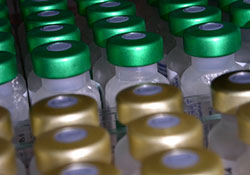Immunization systems

iStockphoto
Immunization is a shared responsibility of governments, legislators, health care providers, parents/caregivers, the pharmaceutical industry and other stakeholders.
A country’s routine immunization system starts when vaccine is supplied by the manufacturer and ends when it reaches children. This process involves a supply system and careful quality control to ensure that only vaccines of demonstrated quality, safety and efficacy are used. Vaccines need to be properly stored to stay potent and uncontaminated, which involves careful logistics and storage systems and continuous monitoring of the cold-chain.
The system also requires an integrated, far-reaching, managerially and materially strong delivery system, with functioning fixed health facilities and outreach services to reach every child targeted. Finally, immunization injections should follow the WHO standard safety regulations.
WHO/Europe supports Member States in strengthening national immunization systems by helping them:
- improve immunization plans and financing;
- build human resource capacity at all levels;
- introduce new approaches and tools, including vaccines;
- improve surveillance, laboratory performance and networking;
- assure vaccine quality, safety and supply; and
- mobilize demand and resources for immunization services.



